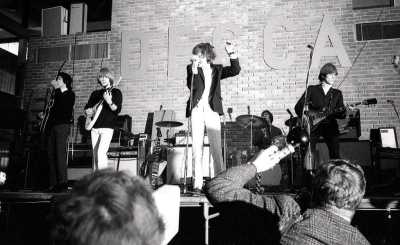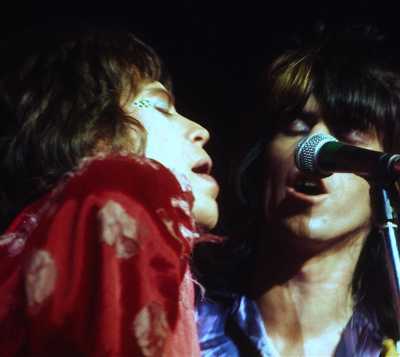10 most iconic songs by The Rolling Stones
Picking just ten iconic Rolling Stones songs is no easy task. Indeed, it's imposible. The band has been making music for over six decades and has amassed a catalog of hits that has had a significant impact on rock music history. Many of us have grown up, quite literally, listening to the Stones. The Rolling Stones have gone through different phases throughout their career, from their early blues-inspired rock to their more experimental and psychedelic sound in the late 60s and early 70s to their more polished and mainstream-oriented work in the 80s and beyond. With so much material to choose from, it's hard to narrow down their best tracks to just ten.
But there are some Rolling Stones songs that stand out from the rest whether because of their catchy melodies memorable lyrics, or cultural significance. These songs have become timeless classics that continue to resonate with audiences today, and they showcase the band's ability to innovate and evolve while staying true to their rock and roll roots. In this list we'll highlight ten of the most iconic Rolling Stones songs, along with some interesting facts and trivia about each one. Let us know what you think of our picks!
1.- "Satisfaction" (1965 Out of Our Heads)
This song is one of the most recognizable and iconic rock songs of all time with its signature riff and lyrics expressing frustration and a desire for something more. It's been covered by countless other bands, including Otis Redding Devo and Britney Spears and has been featured in numerous movies and TV shows.
The famous guitar riff in "Satisfaction" almost didn't happen. Keith Richards originally wrote the song on an acoustic guitar, but wasn't satisfied with the sound. He played around with the riff on a fuzz box and then recorded it on a portable cassette player so he wouldn't forget it. When they went to record the song in the studio, the riff was initially meant to be replaced by a horn section, but Richards insisted on keeping it, and the rest is history.
 The Rolling Stones in concert in Oslo in 1965.
The Rolling Stones in concert in Oslo in 1965.
Øderud, No restrictions, via Wikimedia Commons
2.- "Paint It Black" (1966 Aftermath)
With its haunting, sitar-inspired melody and lyrics about grief and loss, "Paint It Black" is a standout track from the Stones' mid-60s catalog. It's been covered by a wide range of artists, from punk rockers The Cramps to classical pianist Lang Lang.
"Paint It Black" was one of the first songs by a western band to feature the sitar an instrument commonly used in traditional Indian music. Brian Jones, the Stones' multi-instrumentalist, was the one who brought the sitar into the studio and played it on the song. However, it wasn't until George Harrison of The Beatles used the instrument on "Norwegian Wood" later that same year that the sitar became a popular instrument in western rock music. The use of the sitar on "Paint It Black" was a groundbreaking move that helped to expand the boundaries of rock music and introduce audiences to new sounds and influences.
3.- "Jumpin' Jack Flash" (1968, Beggars Banquet)
This song is a classic rock anthem, with its propulsive rhythm and Keith Richards' iconic guitar riff. It's been covered by artists as diverse as Johnny Winter and Aretha Franklin, and was reportedly inspired by Richards' gardener.
"Jumpin' Jack Flash" was written during a turbulent time for the Rolling Stones. The band had been dealing with legal and personal issues, and their previous single, "She's a Rainbow, " had not been well-received. The song's title and lyrics are said to have been inspired by a flash of lightning that Richards saw during a storm which he imagined as the spirit of the band's deceased founding member Brian Jones, jumping back into the group. Despite the challenges they were facing "Jumpin' Jack Flash" became one of the Rolling Stones' most popular and enduring songs.
4.- "Sympathy for the Devil" (1968, Beggars Banquet)
This song's dark foreboding vibe and Mick Jagger's sinister vocals make it one of the Stones' most memorable tracks. It's been covered by artists like Guns N' Roses and Laibach, and has been the subject of numerous literary and cinematic references.
The lyrics to "Sympathy for the Devil" were inspired by Russian novelist Mikhail Bulgakov's book, "The Master and Margarita " which features a character who claims to be the devil. Jagger has said that he was also influenced by the political turmoil and violence of the late 1960s, including the assassinations of Martin Luther King Jr. and Robert Kennedy. The song's controversial subject matter led to it being banned by some radio stations and censored in other forms of media but it also cemented the Rolling Stones' reputation as rebels who weren't afraid to push boundaries.
5.- "Gimme Shelter" (1969, Let It Bleed)
Featuring a powerful vocal performance from Merry Clayton and a memorable guitar riff from Richards, "Gimme Shelter" is a bleak yet powerful commentary on the state of the world in the late 1960s. It's been covered by artists like Patti Smith and The Sisters of Mercy, and has been used in numerous movies and TV shows.
The recording of "Gimme Shelter" was famously chaotic. Clayton was actually called in to sing the backing vocals at the last minute after Jagger decided that the original singer, Claudia Lennear, wasn't delivering the right vibe. Clayton who was heavily pregnant at the time, was driven to the studio in the middle of the night and recorded her vocals in just a few takes. The song's ominous atmosphere is also enhanced by the use of a distorted guitar effect called a "fuzz box " which gives Richards' guitar a menacing, almost otherworldly quality.
6.- "Brown Sugar" (1971, Sticky Fingers)
This song's catchy guitar riff and sexually charged lyrics make it one of the Stones' most controversial tracks. It's been covered by artists like Nina Simone and The Black Crowes and has been referenced in numerous books and movies.
The origins of "Brown Sugar" are somewhat murky. Mick Jagger has said that the song was inspired by the slave trade and the exploitation of Black women but others have criticized the song's lyrics for their overtly sexual and racist content. The song's opening guitar riff, which has become one of the most famous in rock history, was reportedly inspired by a riff played by blues guitarist Freddie King but Keith Richards has said that he doesn't remember where the riff came from and that it just came to him one day while he was noodling around on his guitar. Despite the controversy surrounding the song, "Brown Sugar" remains one of the Rolling Stones' most popular and enduring tracks.
7.- "Tumbling Dice" (1972, Exile on Main St.)
With its infectious chorus and bluesy feel "Tumbling Dice" is a fan favorite and a classic example of the Stones' early 70s sound. It's been covered by artists like Linda Ronstadt and The Black Crowes, and has been used in movies and TV shows like The Sopranos and Casino.
The lyrics to "Tumbling Dice" were reportedly inspired by a conversation that Mick Jagger had with his housekeeper, who was an avid gambler. According to Jagger, she told him that "rolling the dice" was a metaphor for the ups and downs of life, and he decided to incorporate that idea into the song. The song's distinctive piano riff was played by Stones' regular session musician, Nicky Hopkins, who had previously played with The Beatles among others. Despite its popularity "Tumbling Dice" was never released as a single in the UK although it was a hit in the US.
8.- "Angie" (1973, Goats Head Soup)
This ballad features a beautiful acoustic guitar melody and heartfelt lyrics about lost love. It's been covered by artists like Tori Amos and The Rolling Stones themselves, in a re-recorded version for their live album Stripped.
"Angie" is rumored to be about David Bowie's wife, Angela, with whom Jagger was rumored to have had an affair. However, Jagger has denied this claim and has stated that the name "Angie" was chosen simply because it fit the song's melody. Despite its popularity the song was never performed live by the Stones until 1998 when they played it during their Bridges to Babylon tour. The song's beautiful string arrangement was played by Nicky Hopkins, and it's been used in numerous movies and TV shows over the years.
 Bert Verhoeff for Anefo, CC BY-SA 3.0
Bert Verhoeff for Anefo, CC BY-SA 3.0
9.- "Beast of Burden" (1978, Some Girls)
With its soulful groove and memorable chorus, "Beast of Burden" is a standout track from the Stones' late 70s output. It's been covered by artists like Bette Midler and Pearl Jam, and has been featured in movies like The Departed.
Keith Richards has stated that the song was originally written for and about Bianca Jagger Mick Jagger's ex-wife. However Mick Jagger has denied this claim and has stated that the song's lyrics were inspired by the band's hectic lifestyle and the burdens that come with fame and fortune. The song's memorable guitar riff was played by Richards on a Fender Telecaster, and the song has become a staple of the band's live shows, often played as an encore.
10.- "Start Me Up" (1981 Tattoo You)
This song features a catchy guitar riff and a driving beat that make it a classic stadium rock anthem. It's been covered by artists like R.E.M. and The Black Crowes, and has been used in commercials for products like Windows 95 and the iPod.
One interesting fact about "Start Me Up" is that it was actually written in the late 1970s but was not released until the 1981 album Tattoo You. It was originally intended to be included on the 1978 album Some Girls, but the band felt that it wasn't quite finished yet. The song's success helped propel Tattoo You to become one of the Stones' most commercially successful albums.
 Keith Richards and Mick Jagger, concert in Rotterdam, 1982
Keith Richards and Mick Jagger, concert in Rotterdam, 1982
Marcel Antonisse / Anefo, CC0, via Wikimedia Commons
Hey, stoned enough? For us those are ten of the most iconic Rolling Stones songs, each with their own unique qualities and cultural impact, I hope you liked it.
How much do you know about The Rolling Stones? Challenge your knowledge with this complete Rolling Stones Quiz and put your skills to the test!
